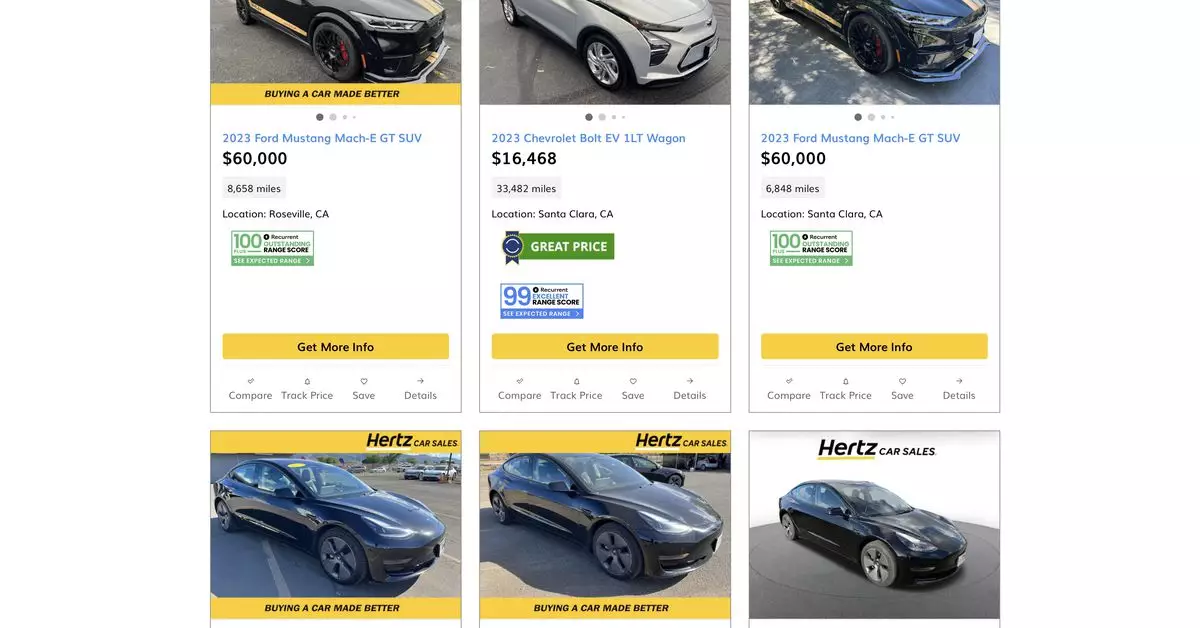In an intriguing and somewhat unexpected move, Hertz is reaching out to its electric vehicle (EV) renters with offers to purchase the cars they have rented rather than returning them. This initiative reflects a broader trend within the rental car industry as companies strive to adapt to the growing popularity of electric vehicles. By allowing EV renters the opportunity to buy their vehicles at competitive prices, Hertz is not just enhancing customer relations but also responding to the increasing consumer demand for sustainable transportation options.
Competitive Pricing Amidst Used Car Demand
Recently, several renters have reported receiving attractive purchase offers for their cars, with one individual sharing on Reddit that they were quoted a price of $17,913 for a 2023 Tesla Model 3. This price is notably favorable, especially considering it is inline with what’s visible on the Hertz Car Sales platform. However, the Model 3 in question has already accumulated around 30,000 miles—which raises questions about the long-term value and viability of purchasing a rental vehicle. Other reported offers include a 2023 Chevrolet Bolt priced at $18,442 and a Polestar 2 listed at $28,500.
What stands out here is how these prices align with current market conditions. Potential buyers are always on the lookout for great deals, and the pricing strategies adopted by Hertz could sway undecided customers toward purchasing used electric vehicles. The limited warranty of 12 months or 12,000 miles further sweetens the deal, easing the purchase decision for wary customers.
Navigating Past Challenges
Hertz’s decision to reach out with purchase offers isn’t merely a marketing gimmick—it signifies the company’s attempts to overcome previous challenges in expanding its electric vehicle rental fleet. Last year, Hertz faced setbacks in its ambitions to electrify its offerings. The company scaled back its investments in EVs due to various factors, including low customer demand and mechanical issues regarding models like the Tesla Model 3. Furthermore, modifications to previously made decisions, such as halting the purchase of Polestar 2 vehicles, indicate that the journey to fully electric fleets is riddled with complexity.
Despite these challenges, Hertz’s newly adopted strategy of connecting rental customers with sales opportunities suggests a pivot towards recognizing the evolving marketplace. Jamie Line, Hertz’s communications director, noted that this initiative of sending offers to customers isn’t a gimmick—it’s part of a calculated approach to enhance awareness about vehicle sales directly within its rental experience.
The rental car industry’s landscape is undeniably transforming, and Hertz’s latest strategies reflect a broader acknowledgment of the growing electric vehicle market. By making it easier for renters to transition into buyers, Hertz not only promotes its own sales but also plays a crucial role in supporting the adoption of electric vehicles. In a world increasingly oriented towards sustainability, this dual approach may serve Hertz well as it refines its business strategies to align with consumer expectations and market demands. The road ahead for both the company and the electric vehicle sector remains dynamic, filled with opportunities and challenges that will shape the future of transportation.

